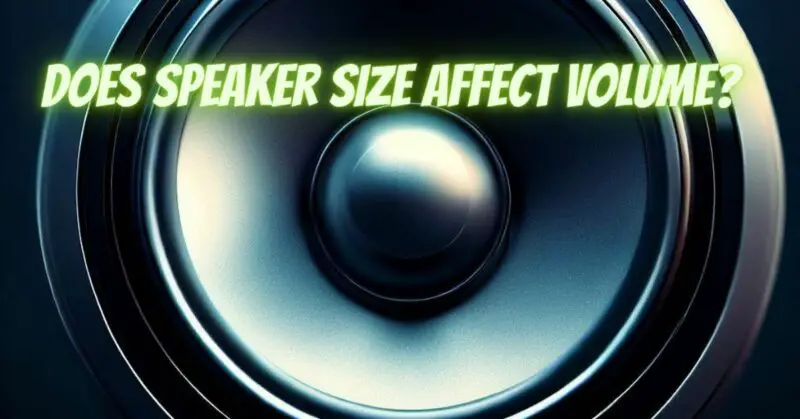The size of a speaker can affect its volume, but there are other factors that also play a role. In general, a larger speaker will be able to produce louder sound than a smaller speaker. However, there are other factors to consider, such as the power handling capabilities of the speaker, the efficiency of the speaker, and the design of the speaker cabinet.
Here are some of the reasons why a larger speaker can produce louder sound:
- Larger cone area: The cone of a speaker is the part that moves back and forth to produce sound. A larger cone area can move more air, which produces louder sound.
- Longer throw: The throw is the distance that the cone moves back and forth. A longer throw can produce louder sound.
- Less damping: Damping is the ability of a speaker to absorb sound waves. Less damping allows the speaker to produce louder sound.
However, there are also some downsides to using a larger speaker:
- They are larger and heavier: Larger speakers are typically larger and heavier than smaller speakers. This can make them more difficult to transport and install.
- They require more power: Larger speakers require more power to drive them than smaller speakers. This can make them more expensive to operate.
- They may not be as efficient: Larger speakers may not be as efficient as smaller speakers. This means that they may not produce as much sound for the same amount of power.
Ultimately, the decision of whether to use a larger speaker or a smaller speaker depends on your individual needs and preferences. If you are looking for the loudest possible speaker, then a larger speaker is a good option. However, if you are looking for a more portable or efficient speaker, then a smaller speaker may be a better choice.
Here are some additional things to keep in mind about speakers and volume:
- The power handling capabilities: The power handling capabilities of the speaker determine how much power the speaker can handle without distorting. A speaker with higher power handling capabilities can produce louder sound.
- The efficiency: The efficiency of the speaker determines how much sound the speaker produces for the amount of power it consumes. A more efficient speaker can produce louder sound for the same amount of power.
- The design of the speaker cabinet: The design of the speaker cabinet can affect the volume of the speaker. A well-designed speaker cabinet can help to improve the efficiency of the speaker and produce louder sound.
If you are looking to improve the volume of your speakers, there are a few things you can do:
- Use larger speakers: As mentioned earlier, larger speakers can produce louder sound.
- Use more powerful amplifiers: More powerful amplifiers can provide more power to the speakers, which can produce louder sound.
- Use a subwoofer: A subwoofer is a specialized speaker that is designed to produce low frequencies. Subwoofers can help to improve the bass response of the speakers, which can make them sound louder.
- Place the speakers in a good location: The location of the speakers can affect their volume. Placing the speakers in a well-positioned location can help to improve the sound quality and make the speakers sound louder.


